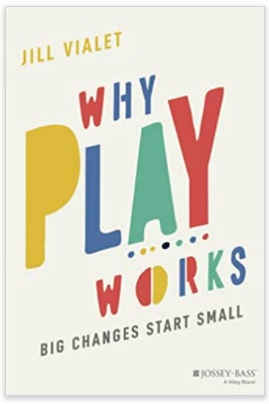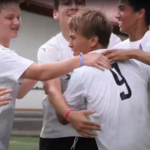






When Yellowstone Reduced its Wolves, Eco-Disaster Ensued. And When America Started Reducing Play Time…
“The analogy is obvious,” says Playworks’ founder Jill Vialet.
Embarrassingly, when I first heard about Playworks a decade ago, I rolled my eyes. An organization that sends recess coaches to schools to teach kids games and Rock/Paper/Scissors?
It sounded like adults micromanaging play.
But then Jill had the guts to call me up — me, the leader of a whole movement devoted to childhood freedom – and tell me her story: How she’d gone to a school to pitch an art course, and instead the principal brushed past her, flopped down and said, “You know what I really need? Someone to fix recess.”
What happens when kids don’t learn childhood games?
Until Jill and I spoke, I hadn’t realized that thanks to the very culture we are both trying to change — a culture keeping kids supervised and sedentary – some kids were literally not learning how to play. Older sisters weren’t teaching younger ones Double Dutch. Neighborhood kids weren’t gathering for kickball games.
So at recess, instead of having fun, then arguing, then getting back to the fun, the arguing dominated.
Jill’s brainchild no-profit gives thousands upon thousands of play-deprived kids a new lease on joy. Her just-out book, “Why Play Works: Big Changes Start Small” describes her journey, her philosophy, and – as promised — why play works (and why Playworks works, too). We spoke by Zoom:
A conversation about making sure play works, at school
LS: Why do you think people don’t consider play that important?
JV: I think we’re so messed up because of our Puritan foundation — the whole work ethic mind-set.
LS: Why SHOULD we take play seriously?
Play is just such a great opening activity. You don’t have to be good at it, you don’t have to speak the language. It’s the ultimate in inclusion. I don’t mean that play is always used for good. It can be exclusionary – which we need to learn to navigate. There’s risk involved. And that’s how you learn to manage risk.
LS: What is it about play that develops kids the most?
Mixing ages seems absolutely to be the special sauce. With older kids, I’m interested in how does play help them see themselves as humans who can make a difference in the world?
LS: Okay – how?
JV: They see that they can have a positive impact on younger kids. That’s transformative.
Informal versus formal education (Hint: Play IS informal education)
LS: Can they get that same lesson in the classroom?
John Dewey wrote about this 100 years ago: informal vs formal education. And for Dewey, play was this very powerful form of informal education. It was how the youngest members of a community were taught the constructs of their society. You played at being a grown-up. And playing in mixed-age groups created all these opportunities to develop leadership and empathy and build not only the strong ties of intimate friendships, but also the loose ties of a larger, extended network.
Loose ties are important! They’re how people find work. They’re needed for health and well-being. But Dewey predicted that as we’d become increasingly obsessed with formal education – rigorous classes, segregated by age – informal education would start falling away.
LS: He got that right.
Play may be the “keystone” vital to kids learning almost anything
JV: His stuff about informal education is such a huge endorsement of the power of play, I named my potbellied pig after him.
LS: A pig named John?
JV: No – Dewey.
LS: Tell him hi. And tell me about something else. One of my favorite parts in your book is where you write about the “keystone concept.”
JV: The concept of a keystone species is an animal or plant has this outsized impact on the environment around it. For instance, when they eliminated the gray wolves at Yellowstone –
LS: Everything went kerflooey! The government killed them off to protect local livestock. But without wolves preying on elk, the elk population exploded. They gobbled up all the plants, which meant the birds and bugs were starving, and the whole ecosystem took a nosedive until the government reintroduced the wolves, and Yellowstone recovered.
JV: And the analogy is obvious.
LS: You’ve devoted your life to re-introducing play back into schools. Is there any proof that it’s the “keystone” schools need?
JV: We did a two-year evaluation of Playworks’ impact and found the schools that did it had increased physical activity, and they recovered the instructional time.
More play, less bullying?
LS: Taking class time away for free play didn’t hurt the kids academically.
JV: Right. And kids reported feeling safer throughout the school day. And teachers reported less bullying.
LS: I read that Playworks has as big an impact on bullying as actual anti-bullying programs.
Kids having access to play is the pre-condition for all the other behaviors you want to see. To help kids read, or be inclusive, or not express their frustration through violence. It allows kids to feel safe and connected and be able to take risks and trust their fellow students.
And there are ways it totally reinforces our entrepreneurial values, too. You don’t have a game unless you start.
LS: Can’t start a fire without a spark. And not to sound like a commercial, but you say it even promotes inclusion and diversity?
It builds trust. It creates the preconditions necessary to getting to know each other, and a slightly less fraught opportunity to address the issues. It brings out the best in kids.
Play gives even “bad” kids a second chance
LS: What about the kids who aren’t the best?
Part of the training [to be a Playworker] is we give them permission to give kids a second chance, to take the risk of possibly being wrong about a kid who showed every indication of being a pain in the neck.
LS: You give kids the benefit of the doubt.
JV: It’s more positive than that. It sounds woo-woo, but there’s something super sacred about each little human and with the right set of conditions and the chance to be play and be unconditionally loved –
LS: Miracles can happen?
JV: Joy.




Add your comment now using your favorite social account or login to your LetGrow account.